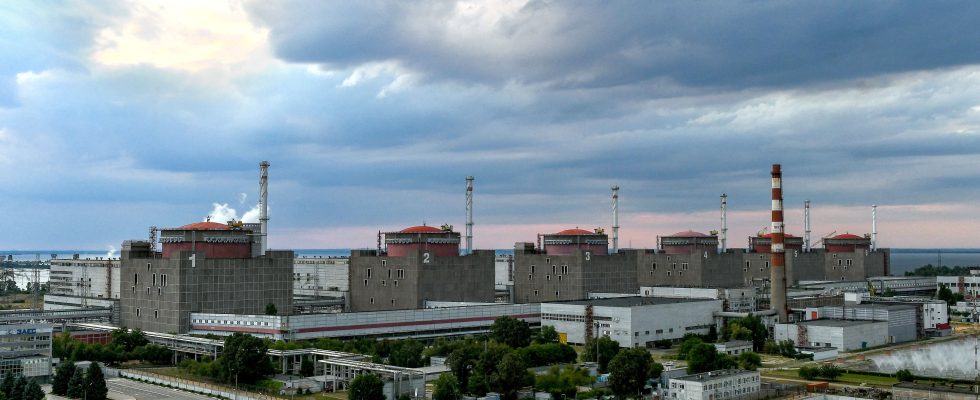Almost two years after the start of the war in Ukraine, the European Union wants to show solidarity with kyiv. French President Emmanuel Macron urged French defense manufacturers this Friday to accelerate the transition to “war economy mode” in order to respond more quickly to Ukraine’s needs. For his part, European Commissioner Thierry Breton affirmed the EU’s capacity to produce at least 1.3 million shells by the end of the year.
Information to remember
⇒ Mines have been replaced around the Zaporizhia nuclear power plant
⇒ Macron wants a “war economy” to help Ukraine
⇒ The EU prepares a 13th package of sanctions against Russia
Mines have been relocated around the Zaporizhia nuclear power plant
Mines have been replaced around the Ukrainian nuclear power plant in Zaporizhia, the International Atomic Energy Agency (IAEA) assured this Friday evening. In the hands of Moscow’s forces since March 2022, the power plant, the largest in Europe, has been hit several times by power outages linked to the fighting and the Russian army regularly accuses Ukraine of threatening it.
The mines were removed in November, but were reinstalled, which is “inconsistent with IAEA safety requirements,” the agency said in a statement. They are “in an area […] prohibited to employees who operate the plant”, between the interior and exterior fences of the installation, according to the institution based in Vienna. The latter still does not have access to several parts of the plant, Moscow having given reasons of security at the beginning of the month to limit this access.
Macron wants a “war economy” to help Ukraine
President Emmanuel Macron urged French defense manufacturers this Friday to accelerate the transition to “war economy mode” in order to respond more quickly to Ukraine’s needs. “We will continue to help the Ukrainians” because “we cannot let Russia think that it can win […]. A Russian victory is the end of European security,” said the Head of State, during his greetings to the armies at the Cherbourg naval base (Manche).
As a reminder, the Head of State announced, during a press conference on January 16, new arms deliveries: around forty Scap long-range missiles, around fifty AASM bombs (modular air-ground weapons) per month for a year… Emmanuel Macron is also expected in Ukraine in February to conclude a security agreement with kyiv.
Questioned for his part on the LCI channel, Friday evening, the Minister of the Armed Forces Sébastien Lecornu estimated that Russia was “necessarily responsible” for any “escalation” and the Ukrainian strikes on its soil, which are increasing. “If there is an escalation, it is reprehensible, but it is inevitably Russia which is responsible. Be careful not to make the victim appear to be the aggressor,” he declared, while denying that French long-range Scalp missiles are used to strike Russian territory.
The European Union will have the capacity to produce at least 1.3 million shells by the end of 2024
As the European Union faces the twin challenges of providing military aid to Ukraine and replenishing its own stocks, European Commissioner Thierry Breton said the EU will have the capacity to produce at least 1.3 million of shells by the end of the year.
During a visit to Tallinn on Friday, the Internal Market and Industry Commissioner said the priority was to ensure that the majority of artillery shells produced by European companies were destined for Ukraine. Speaking alongside Estonian Prime Minister Kaja Kallas, the European Commissioner assured that the EU would reach its target of having a production capacity of one million shells per year in March or April.
The European Union prepares a 13th package of sanctions against Russia
According to diplomatic sources, the European Union wants to announce a 13th package of sanctions against Russia on the occasion of the second anniversary of the Russian invasion of Ukraine on February 24. Discussions are underway, but these sanctions should mainly concern personalities and organizations, however, indicated a senior European official, on condition of anonymity.
The head of European diplomacy Josep Borrell “is very keen on the idea that we are going to mark the second anniversary of the aggression [de la Russie contre l’Ukraine] with a package of sanctions mainly targeting individuals and entities,” he declared this Friday.
The Baltic countries and Poland are among the most favorable to sanctions targeting the nuclear sector or Russian liquefied natural gas imports, but other member states are more reluctant. The EU is also considering, in coordination with the G7 countries, ways to use frozen Russian assets, which amount to some $300 million.
